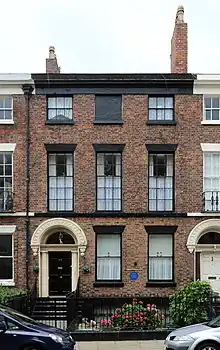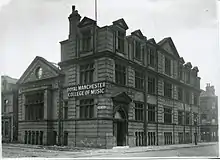Gordon Green (pianist)
Gordon Green, OBE (1905-1981) was an English pianist and pedagogue. Early on he was appointed Director of the Liverpool School of Music (1935),[1] and subsequently taught at both the Royal Manchester College of Music (now known as Royal Northern College of Music)[2][3] and at the Royal Academy of Music, London. In 1972, Green received an honorary degree (Hon MA) from the University of Liverpool.[4]

Biography
Education
Gordon Green was born in Barnsley, just outside the village of Darton, England. The son of the local headteacher, he started piano at first with his mother and then with a local visiting pianist who would come to his school to play for the children.[5] He attended Wakefield Grammar school and was subsequently educated at the Royal Manchester College of Music (RMCM), where he studied with Franck Merrick. At the end of his studies, he won the Gold Medal (1926) which included lessons with Egon Petri in Poland.[6] The first time Green's name is encountered in the College's archives, is in connection to an examination concert (8 July 1925) playing the first movement of Brahms' F minor Piano Sonata.[7] His name is also mentioned soon after on March 9, 1926 when Green performed Bach's double piano concerto in C minor with composer and close friend Alan Rawsthorne.
Career
Gordon Green became teacher of piano at the RMCM in the summer of 1945, and as a performer made appearances with orchestras such as the BBC Philharmonic, the Liverpool Philharmonic Orchestra, and Hallé Orchestra. Green is also the dedicatee of Alan Rawsthorne's Ballade in G# minor (1929), and the Four Bagatelles (1938).[8] Moreover, he gave the premiere of Rawsthorne's Valse in c minor (c.1927). He was also the performer of Rawsthorne's Piano Concerto: Green's own score is preserved in the RNCM Archives and contains some of his practice annotations and separate notes.[9] Gordon Green was the first pianist to performworks by Hindemith in England (1934), although his colleague at the RMCM, Franz Reizenstein, is credited with being the first to perform the composer's Three Sonatas in a concert at Wigmore Hall (1938).[10]
Green the educator
Despite having studied with Egon Petri, a former pupil of Ferruccio Busoni, Green considered himself a Leschetizkian, at least according to former pupils' accounts such as Martino Tirimo and Philip Fowke. This brings Green in closer alignment with his previous teacher, Franck Merrick, who had studied with Leschetizky. From the published concert reviews as well as his own extensive editing and preface comments on the use of the pedal, it becomes clear that sound was of paramount importance.[11] Furthermore, his interest in more modern repertoire, such as Bartok, Hindemith, Prokofiev, Falla, and the outputs of his contemporaries Rawsthorne, Pitfield and Arnold Bax among others, alongside canonic repertoire, such as works by Brahms, Liszt, Chopin, must have imbued his teaching with wider-ranging views on interpretation.
Notable pupils
Green's numerous pupils include several concert artists and conservatoire professors, such as Philip Fowke (b. 1950), Martino Tirimo (b. 1942), Sir Stephen Hough (b. 1961),[12] Martin Roscoe (b.1952), Stephen Coombs (b.1960), John P. R. Blakely (b. 1947), Peter Bithell,[13] Tessa Uys (b.1948), Martin Jones (b.1940), Richard McMahon, Christian Blackshaw,[14] MBE (b. 1949), Harold James Taylor (1925-2014), John McCabe (1939-2015), Malcolm Lipkin (1932-2017), Tessa Uys (b.1948), Heather Slade-Lipkin (1947-2017). Other notable musicians who trained with him during the course of their studies include Gordon Fergus-Thompson (b.1952), Peter Donohoe, CBE (b.1953), conductor Sir Simon Rattle (b.1955) among many others. He also coached John Ogdon (1937-1989) for his participation in the 1962 Tchaikovsky International Piano Competition, in which Ogdon won first prize (ex-aequo with Vladimir Ashkenazy).

Activities and sources
Later in his life, Green joined the teaching staff of the Royal Academy of Music in London. His hour-long interview with Alan Rawsthorne on BBC Radio 3 has been preserved as a non-digitised tape located in the British Library's Sound and Moving Image catalogue.[15] However, the broadcasts of his performances are now considered nonextant. What remains is the majority of the concert reviews and notices available through the British Newspaper Archive and The Musical Times (usually in the section Music in the Provinces).[16] Among the few direct sources salvaged however, there is Gordon Green's edition of selected Liszt pieces for Oxford University Press,[17] his letter to the editor printed in the Liverpool Daily Post (Music in Soviet Russia)[18] and an essay titled 'Alan Rawsthorne: The Pre-War Years'.[19] In the summer of 1980, few months before Green's death, a Hope Street Festival concert was presented featuring Stephen Hough, Martino Tirimo and Christian Blackshaw performing concertos with the Royal Liverpool Philharmonic Orchestra under Sir Charles Groves in his honour (see relevant mention in Stephen Hough's interview to the Liverpool Daily Post, 1983).[20]
Following his death, the Gordon Green Memorial Scholarship was instituted at the Royal Northern College of Music. In the Musical Times of 1985 there is indeed a notice of John Ogdon's recital in aid of this fund.[21] Nowadays, Green's presence is felt through scattered references, such as in Christopher Headington's journal article on Malcolm Lipkin and His Recent Music,[22] the slightly more extensive mention in Hamish Good's The Music of Malcolm Lipkin,[23] or McCabe's interview.[24] Quite a few of his former pupils have been active in their efforts to commemorate or otherwise pay tribute to Green, including Stephen Hough (see references in his book Rough Ideas, but also in his interviews and posts on social media),[25] Philip Fowke, Martino Tirimo. More specifically, such efforts include Philip Fowke's lengthy interview to Alistair Hogarth[26] and a forthcoming PhD thesis (2023) by Natalie Tsaldarakis which includes previously unpublished material and sources (City, University of London, supervisor: Dr. Ian Pace).[27]
Gordon Green was conferred a diamond jubilee year Fellowship from the Manchester College of Music (FRMCM Honorary Fellow) in 1953. He died from cancer in 1981, shortly after being conferred OBE[28] in the Queen's New Year Honours List 1981.
References
- "Music and Musicians: Liverpool School of Music". Liverpool Daily Post. 1935-03-07. p. 7. Retrieved 2023-03-01.
- Kennedy, Michael (1971). The History of the Royal Manchester College of Music. London, Beccles, and Colchester: Manchester University Press. p. 92. ISBN 0-7190-0435-7.
- "Royal Manchester College of Music". The Musical Times. 86 (1231): 283. 1945. doi:10.2307/934517. JSTOR 934517 – via JSTOR.
- "Appointments, Awards". The Musical Times. 113 (1551): 484. 1972. doi:10.2307/955459. JSTOR 955459. Retrieved 2023-03-01 – via JSTOR.
- N. Tsaldarakis (2021): Interview with Nick Green, son of Gordon Green. Unpublished.
- "Music and Musicians: Gordon Green". Liverpool Daily Post. 1945-08-02. p. 4. Retrieved 2023-03-01.
- Kennedy, Michael (1971). The history of the Royal Manchester College of Music, 1893-1972. Manchester University Press. p. 77. OCLC 1341885621.
- Dressler, John Clay (2004). Alan Rawsthorne : a bio-bibliography. Praeger. ISBN 0-313-30589-7. OCLC 474644163.
- RNCM Archive, item GB GB1179 AR-AR/1-AR/1/083d Concerto no.1 version 2; contains annotations by Rawsthorne and Gordon Green.
- E., E. (1938-06-02). "The Music of Paul Hindemith". L;iverpool Daily Post. p. 10. Retrieved 2023-03-05.
- Green, Gordon, ed. (1971). Oxford Keyboard Classics: Liszt. London & New York: Oxford University Press. ISBN 0193732173.
- "Piano Man". Serenade. Retrieved 2023-01-24.
- "Peter Bithell | Guildhall School of Music". Guildhall School of Music. Retrieved 2023-03-01.
- "Meet our alumni". Royal Academy of Music. Retrieved 2023-01-24.
- "The British Library Sound and Moving Image Catalogue". The British Library. Retrieved 2023-03-01.
- "Music in the Provinces". The Musical Times. 86 (1228): 190. 1945. JSTOR 934388 – via JSTOR.
- Liszt, Franz (1973). Liszt: a selection. Oxford University Press. ISBN 0-19-373217-3. OCLC 1157090580.
- "Letters to the Editor: Music in Soviet Russia". Liverpool Daily Post. 1941-07-19. p. 2. Retrieved 2023-03-01.
- "Alan Rawsthorne: The pre-war years by Gordon Green". www.musicweb-international.com. Retrieved 2023-01-24.
- Bawden, Rex (1983-01-21). "Rex Bawden on a super-bright Prospect. The World and his Feet and Hands". Liverpool Daily Post. p. 17. Retrieved 2023-03-01.
- "John Ogdon". The Musical Times. 126 (1713): 678. 1985. doi:10.2307/965057. JSTOR 965057 – via JSTOR.
- Headington, Christopher (1989). "Malcolm Lipkin and his Recent Music". Tempo. 169 (169): 28–33. doi:10.1017/S0040298200025134. JSTOR 945320. S2CID 144424580. Retrieved 2023-03-01 – via JSTOR.
- Good, Hamish (1969). "The Music of Malcolm Lipkin". The Musical Times. 110 (1522): 1237–1240. doi:10.2307/954523. JSTOR 954523 – via JSTOR.
- Briggs, Bob. "Seventy Not Out! An Interview with the UK composer John McCabe". Seen and Heard International. Retrieved 2023-03-05.
- Woodall, Tim. "Rough Ideas by Stephen Hough | Classical Music Books". Faber. Retrieved 2023-01-24.
- Alisdair Hogarth interviews Philip Fowke and John Blakely about Gordon Green OBE, retrieved 2023-01-24
- "Natalie Tsaldarakis | City, University of London". www.city.ac.uk. 2021-10-29. Retrieved 2023-01-24.
- "Page 1 | Supplement 48467, 30 December 1980 | London Gazette | The Gazette". www.thegazette.co.uk. Retrieved 2023-01-24.